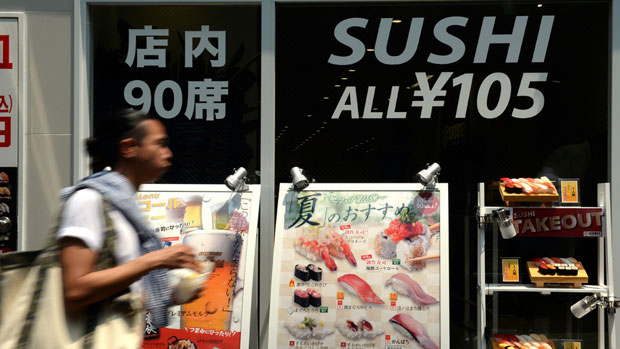Japanese worker shamed on TV for taking lunch three minutes early
Bosses bow in apology at press conference over civil servant’s ‘regrettable misconduct’

A free daily email with the biggest news stories of the day – and the best features from TheWeek.com
You are now subscribed
Your newsletter sign-up was successful
A Japanese civil servant was fined and publicly reprimanded in a televised press conference after officials found he had been taking his lunch break three minutes early.
The 64-year-old worker, employed by the water department in the western city of Kobe, was clocked leaving his desk a few minutes before noon on 26 occasions over seven months.
Bosses were called in “when another official looked out an office window and saw the worker leave the building and head towards a nearby bento store,” according to English-language Japanese news website Sora News 24. Each trip was estimated to take around three minutes.
The Week
Escape your echo chamber. Get the facts behind the news, plus analysis from multiple perspectives.

Sign up for The Week's Free Newsletters
From our morning news briefing to a weekly Good News Newsletter, get the best of The Week delivered directly to your inbox.
From our morning news briefing to a weekly Good News Newsletter, get the best of The Week delivered directly to your inbox.
The errant employee was docked half a day’s pay for unprofessional conduct - but that wasn’t the end of the saga.
City officials called a press conference to address the “scandal”, where they lamented the employee’s “immensely regrettable” offence and bowed in front of reporters as a show of remorse.
The incident “sparked a heated debate on social media”, says The Japan Times, “with many defending the official”.
Coincidentally, the news broke “soon after MPs passed a law intended to address Japan’s punishingly long working hours”, says The Guardian.
A free daily email with the biggest news stories of the day – and the best features from TheWeek.com
The government has come under increasing pressure to address a hierarchical corporate culture which often demands total devotion with little regard for workers’ wellbeing.
Death from overwork is common enough to have its own name - karoshi - while recent high-profile stories have drawn attention to intrusive practices like “pregnancy rotas”, where employees are expected to hold off having a baby until their designated “turn”.
-
 The environmental cost of GLP-1s
The environmental cost of GLP-1sThe explainer Producing the drugs is a dirty process
-
 Greenland’s capital becomes ground zero for the country’s diplomatic straits
Greenland’s capital becomes ground zero for the country’s diplomatic straitsIN THE SPOTLIGHT A flurry of new consular activity in Nuuk shows how important Greenland has become to Europeans’ anxiety about American imperialism
-
 ‘This is something that happens all too often’
‘This is something that happens all too often’Instant Opinion Opinion, comment and editorials of the day
-
 Epstein files topple law CEO, roil UK government
Epstein files topple law CEO, roil UK governmentSpeed Read Peter Mandelson, Britain’s former ambassador to the US, is caught up in the scandal
-
 Iran and US prepare to meet after skirmishes
Iran and US prepare to meet after skirmishesSpeed Read The incident comes amid heightened tensions in the Middle East
-
 Israel retrieves final hostage’s body from Gaza
Israel retrieves final hostage’s body from GazaSpeed Read The 24-year-old police officer was killed during the initial Hamas attack
-
 China’s Xi targets top general in growing purge
China’s Xi targets top general in growing purgeSpeed Read Zhang Youxia is being investigated over ‘grave violations’ of the law
-
 Panama and Canada are negotiating over a crucial copper mine
Panama and Canada are negotiating over a crucial copper mineIn the Spotlight Panama is set to make a final decision on the mine this summer
-
 Why Greenland’s natural resources are nearly impossible to mine
Why Greenland’s natural resources are nearly impossible to mineThe Explainer The country’s natural landscape makes the task extremely difficult
-
 Iran cuts internet as protests escalate
Iran cuts internet as protests escalateSpeed Reada Government buildings across the country have been set on fire
-
 US nabs ‘shadow’ tanker claimed by Russia
US nabs ‘shadow’ tanker claimed by RussiaSpeed Read The ship was one of two vessels seized by the US military